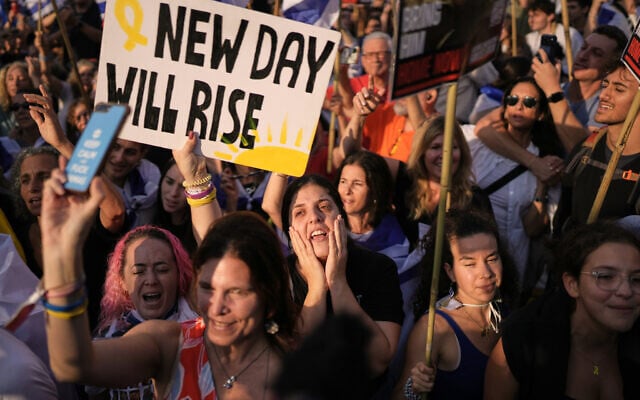
וְיֵשׁ־תִּקְוָה לְאַחֲרִיתֵךְ נְאֻם־ה׳ וְשָׁבוּ בָנִים לִגְבוּלָם׃There is hope for your future — declares GOD:
Your children shall return to their country.— Jeremiah 31:17 (Haftarah for Rosh Hashanah Day 2)
The day the hostages came home, I stayed up half the night to watch their convoy cross into Israel from Gaza in real time, and was glued to Israeli media the next day watching joyful family reunions and scenes of jubilation in Hostage Square in Tel Aviv. Like many of my Jewish friends, I experienced a sense of joyful relief — like I could release a breath I didn’t know I had been holding for the past two years.
As I write these lines, the coffins are just beginning to return, containing hostages who died in captivity. A sad closure for their families — and a reminder of all that has been lost. Close to 2,000 Israelis have died, and over 68,000 Palestinians. Gaza lies in ruins, Israel’s international standing is in tatters, and two peoples have sunk ever deeper in what feels like unending trauma. It is too soon to know how long the ceasefire will hold, whether Hamas will succeed in reasserting its control, whether the Arab world’s commitment to the ceasefire will translate into renewed movement towards normalized relations with Israel, or whether the surge in anti-Semitism around the world will abate now that the guns have fallen silent. I don’t even know if all of our dead will be returned.
Meanwhile, more and more of us Jews in the diaspora are asking ourselves how central Zionism needs to be in our Jewish identity. A century ago, most American Jews had let go of the idea of a return to the land of our ancestors. This was the goldeneh medineh! Even if it turned out the streets weren’t paved with gold after all, a Jew could do more in America than in any place before. Why waste our energy on settling a desert? It wasn’t until the horrors of the Holocaust that American Jews were convinced of the necessity of a homeland for Jews. And after the miraculous victory of the 1967 war, we started to think it might be fate —”the first sprouting of our redemption,” as our prayer for Israel says in the Hebrew. But for many American Jews today, the ’67 victory feels like the beginning of the end — the moment when Jews became oppressors, and talk of redemption the province of messianic fundamentalists.
But — the guns have fallen silent (at least for now) and the hostages are home at last. Don’t we deserve a bit of joy?
Our tradition is practiced at mixing sorrow with joy. The breaking of glass at a wedding is often understood as reminder of the pain of a broken world. “If I forget you, O Jerusalem, let my right hand wither,” wrote the psalmist in exile on the waters of Babylon, “let my tongue stick to my palate if I cease to think of you, if I do not keep Jerusalem in memory even at my happiest hour” (Psalm 137). The hostages were retuned two years to the day from their abduction, as reckoned on the Jewish calendar: on the eve of the combined day of Shmini Atzeret and Simchat Torah — a day that we traditionally observe as two in the diaspora. Simchat Torah, literally “the Joy of the Torah,” is one of the happiest holidays on our calendar. Shemini Atzeret, while not sad per-se, is often translated as “a day of solemn gathering,” and is one of the four dates on which we traditionally recite Yizkor in memory of all our dead. Before we danced with our Torahs this past Simchat Torah, we took a few moments to stand in solemn remembrance, carrying our sorrows into our celebration.
DON’T HESITATE
by Mary Oliver
If you suddenly and unexpectedly feel joy,
don’t hesitate. Give in to it. There are plenty
of lives and whole towns destroyed or about
to be. We are not wise, and not very often
kind. And much can never be redeemed.
Still, life has some possibility left. Perhaps this
is its way of fighting back, that sometimes
something happens better than all the riches
or power in the world. It could be anything,
but very likely you notice it in the instant
when love begins. Anyway, that’s often the
case. Anyway, whatever it is, don’t be afraid
of its plenty. Joy is not made to be a crumb.Oliver, Mary. Devotions. Penguin Press, NY: 2017. (pg. 61)
